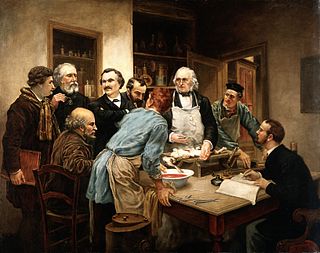
Physiology is the scientific study of the functions and mechanisms which work within a living system.

Schack August Steenberg Krogh was a Danish professor at the department of zoophysiology at the University of Copenhagen from 1916 to 1945. He contributed a number of fundamental discoveries within several fields of physiology, and is famous for developing the Krogh Principle.

Johannes Peter Müller was a German physiologist, comparative anatomist, ichthyologist, and herpetologist, known not only for his discoveries but also for his ability to synthesize knowledge.
Richard Darwin Keynes, CBE, FRS was a British physiologist. Great-grandson of Charles Darwin, Keynes edited his grandfather's accounts and illustrations of Darwin's famous voyage aboard HMS Beagle into The Beagle Record: Selections From the Original Pictorial Records and Written Accounts of the Voyage of the H.M.S. Beagle, which won praise from the New York Review of Books and The New York Times Book Review.

Prof Friedrich Tiedemann FRS HFRSE was a German anatomist and physiologist. He was an expert on the anatomy of the brain.

Anton Julius Carlson was a Swedish American physiologist. Carlson was Chairman of the Physiology Department at the University of Chicago from 1916 until 1940.

Sir Joseph Barcroft, CBE, FRS was a British physiologist best known for his studies of the oxygenation of blood.
Sir Michael John Berridge, FRS FMedSci FBPhS (born 22 October 1938) is a British physiologist and biochemist. Born and raised in Southern Rhodesia (today Zimbabwe), he is best known for his work on cellular transmembrane signalling, in particular the discovery that inositol trisphosphate acts as a second messenger, linking events at the plasma membrane with the release of Ca2+ within the cell. As of 2009, he is the Emeritus Babraham Fellow in the Signalling Programme Department of the Babraham Institute, Cambridge, and honorary professor of cell signalling at the University of Cambridge.
Physiological and Biochemical Zoology is a peer-reviewed scientific journal published by the University of Chicago Press on behalf of the Society for Integrative and Comparative Biology. Traditionally, it has covered research on the biochemistry, physiology, and genetics of animals. A recent editorial change has expanded the scope to include life-history traits, comparative biomechanics, and behavioral endocrinology, as well as a wider range of paper categories, including those related to educational outreach. The current editor-in-chief is Theodore Garland, Jr.. Previous Editors include Charles Manning Child, Warder Clyde Allee, and Clifford Ladd Prosser. The journal was established in 1928 as Physiological Zoology, obtaining its current name in 1999. According to the Journal Citation Reports, the journal has a 2017 impact factor of 2.291.
Ralph Waldo Gerard LLD DLitt was an American neurophysiologist and behavioral scientist known for his wide-ranging work on the nervous system, nerve metabolism, psychopharmacology, and biological basis of schizophrenia.
Shu Chien, is a Chinese–American physiologist and engineer. His work on the fluid dynamics of blood flow has had a major impact on the diagnosis and treatment of cardiovascular diseases such as atherosclerosis. More recently, Chien's research has focused on the mechanical forces, such as pressure and flow, that regulate the behaviors of the cells in blood vessels. Chien is currently President of the Biomedical Engineering Society and is one of only 11 scholars who are members of all three U.S. national institutes: the National Academy of Sciences, National Academy of Engineering, and the Institute of Medicine.
Feng Depei or Te-Pei Feng was a Chinese neuroscientist, physiologist, and educator. He is considered as one of founders of modern Chinese neuroscience and physiology.
Prof. Madhu Sudan Kanungo was an eminent Indian scientist in the field of gerontology and neuroscience as well as a teacher of molecular biology and biochemistry. He is known for his theories on how gene expression changes with age and the role of this phenomenon in ageing, which is a widely accepted as "Gene expression theory of Aging". In recognition of his contributions, he was awarded India's fourth highest civilian award, Padma Shri in 2005. He held the post of BHU Emeritus professor in zoology at the Banaras Hindu University and was also the Chancellor, Nagaland University till his death.
Paul Jackson Kramer was an American biologist and plant physiologist.
The following outline is provided as an overview of and topical guide to physiology:
Prafullachandra Vishnu Sane is an Indian molecular biologist and plant physiologist, known for his pioneering studies on photosynthesis. He is a former director of National Botanical Research Institute and an elected fellow of the Indian Academy of Sciences, Indian National Science Academy, National Academy of Sciences, India, National Academy of Agricultural Sciences and the Maharashtra Academy of Sciences. The Council of Scientific and Industrial Research, the apex agency of the Government of India for scientific research, awarded him the Shanti Swarup Bhatnagar Prize for Science and Technology, one of the highest Indian science awards, in 1981, for his contributions to biological sciences.
Abraham Clifford Barger was an American professor of physiology who spent his entire career at Harvard Medical School. His research focused on the pathophysiology of heart failure and on the role of the kidneys in hypertension. Barger served as the president of the American Physiological Society in 1970-71 and was elected to the Institute of Medicine in 1974.
G. Taru Sharma is an Indian biologist and the head of the physiology and climatology division at the Indian Veterinary Research Institute of the Indian Council of Agricultural Research. Known for her studies on germ cell marker genes, Sharma is an elected fellow of the National Academy of Agricultural Sciences. The Department of Biotechnology of the Government of India awarded her the National Bioscience Award for Career Development, one of the highest Indian science awards, for her contributions to biosciences in 2006.







